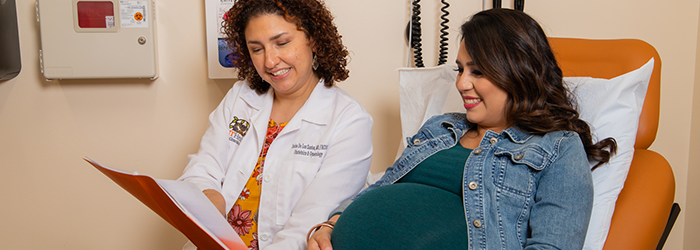Health Education & Patient Care

UTRGV is committed to utilizing a holistic and person-centered approach to health education and clinical care to meet regional healthcare needs, promote community well-being, increase health literacy, and enhance healthcare providers’ talent strategies. Over 30% of the population under the age of 65 in Cameron, Hidalgo, and Starr Counties lack health insurance. In May 2020, our School of Medicine – the first in South Texas – graduated its first class of physicians. During the early stages of the COVID-19 pandemic, our healthcare faculty, staff, and learners continued meeting the needs of South Texas by operating drive-through testing sites across the region. UTRGV trains students in a multitude of health professions such as nursing, social work, and occupational therapy. Recently, UTRGV was ranked seventh in the nation for graduate degrees granted to Hispanic/Latino students in the health professions.
UTRGV plans to invest in infrastructure and capacity expansions to enhance the University’s health education, quality and accessibility of healthcare services, and patient experience. Building on the demonstrated leadership of UT Health RGV and the Colleges / Schools of Medicine, Nursing, Health Professions, and Social Work during the COVID-19 pandemic, the University is poised to continue addressing a range of healthcare needs and disparities in the Rio Grande Valley, South Texas, and beyond.
- Signature Initiatives in Support of Health Education & Patient Care
- Expand Our Academic, Clinical, and Research Portfolio: Launch new ventures such as the UTRGV Cancer and Surgery Center and the Institute of Neuroscience; Introduce new academic programs in high-demand disciplines, including the Doctor of Podiatric Medicine and Doctor of Nursing Practice.
- Foster Cross-Campus and Community Partnerships: Increase partnerships across the campuses and in the community to promote well-being, health literacy, and access to health services in the Rio Grande Valley; Foster interprofessional healthcare education and clinical care, building on the AHEC model.
- Develop a Pipeline of Diverse and Highly Qualified Medical Professionals: Continue to strengthen the pipeline of Hispanic and non-Hispanic medical professionals in the Rio Grande Valley through access programs including the Luminary Scholarship program, Vaqueros MD and PACT, building on the success of producing healthcare graduates over the last seven years.
- Improve Health Outcomes in South Texas: Continue to address regional healthcare needs and health disparities by enhancing the quality of existing services (as measured by factors including patient and provider satisfaction) and increasing physical and mobile health locations.
